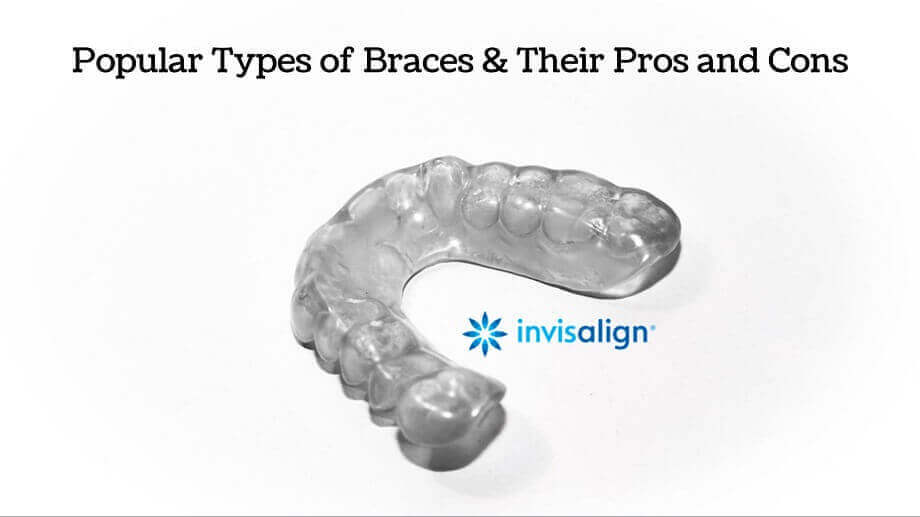Popular Types of Braces
Popular Types of Braces & Their Pros and Cons
Advances in dental technology today allows you to choose between several different types of braces. The traditional metal braces are not the only choice anymore. Many modern and popular types of braces are unobtrusive and barely visible. The most popular types of braces include Invisalign, self-ligating braces, lingual braces, and retainers.
Each different types of braces has pros and cons.
Invisalign
Invisalign uses a series of clear aligners to straighten your teeth. Invisalign is custom-made for each person’s mouth
designed to fix your teeth by moving them a little bit at a time.
Pros of Invisalign Aligners
One of the biggest advantages of Invisalign is that it can easily be removed to eat anything you want. You can also remove it to brush your teeth. Invisalign is almost invisible. Most people won’t notice you wearing them.
Cons of Invisalign Aligners
You must wear them for at least 20 hours a day. If you do not wear it for the recommended time, it may not work for your teeth. It also may not be suitable for more complex problems.
Self-Litigating Braces
These braces are similar to traditional metal braces that have been used for many years, but instead of metal manufacturers use clear or ceramic brackets. Clips are used to hold the wire in place instead of the traditional elastic bands, making it easier to work around the braces and keep teeth clean.
These are a very popular type of braces Hemel Hempstead.
Pros of Self-Litigating Braces
Self-litigating braces address a large variety of problems with teeth, from simple to complex. They allow your clinician to have complete control, permitting more precise movements of your teeth.
Cons of Self-Litigating Braces
One of the biggest drawbacks of self-litigating braces is that they are not as discreet. The wires stand out and are easily noticeable. It is more difficult to keep your teeth clean with all the wires and brackets that must remain in place.
Lingual Braces
Lingual braces are like traditional braces except they attach to the inside of your teeth. They won’t be seen, but they will work just like a regular fixed brace. The brackets for this type of brace are custom-made to fit your mouth exactly.
Pros of Lingual Braces
These are completely invisible when you smile or open your mouth. Only you and your dentist will know that you have braces. Lingual braces are also very versatile and can be used to solve most types of alignment problems.
Cons of Lingual Braces
Since lingual braces fit on the inside of your mouth, your tongue rubs up against them. You may have a little trouble speaking at first until you get used to them.
Lingual braces are more expensive than most other popular types of braces due to the difficulty in fitting them and the custom-made materials. A dentist must have special training to fit these brace forms.
Lingual may not be suitable for people with deep overbites.
Retainers
Retainers are not meant to move your teeth into place. Retainers are worn after you have finished your regimen of wearing braces. They are designed to keep your teeth from reverting back to their original positions before you had braces.
There are two types of retainers available: removable and fixed.
Removable retainers are custom-made for your mouth and fit closely to each tooth to keep them in place. These can be removed at any time.
Fixed retainers, made of thin stainless-steel wires, are permanently fixed to the backside of the front teeth to prevent tooth movement.
Pros of Retainers
Retainers help keep your teeth stay in their proper place. You only need wear removable retainers at night.
Fixed retainers are not noticeable and do not interfere with the normal functioning of your jaw and tongue.
Cons of Retainers
The only drawback of removable retainers is remembering to wear them at night.
There are no drawbacks to fixed retainers.
Final Thoughts
Today patients have a number of choices popular types of braces.
If you think you are a candidate for braces, make an appointment with your dentist and discuss with him or her which option is most suitable for your mouth






Leave a Reply